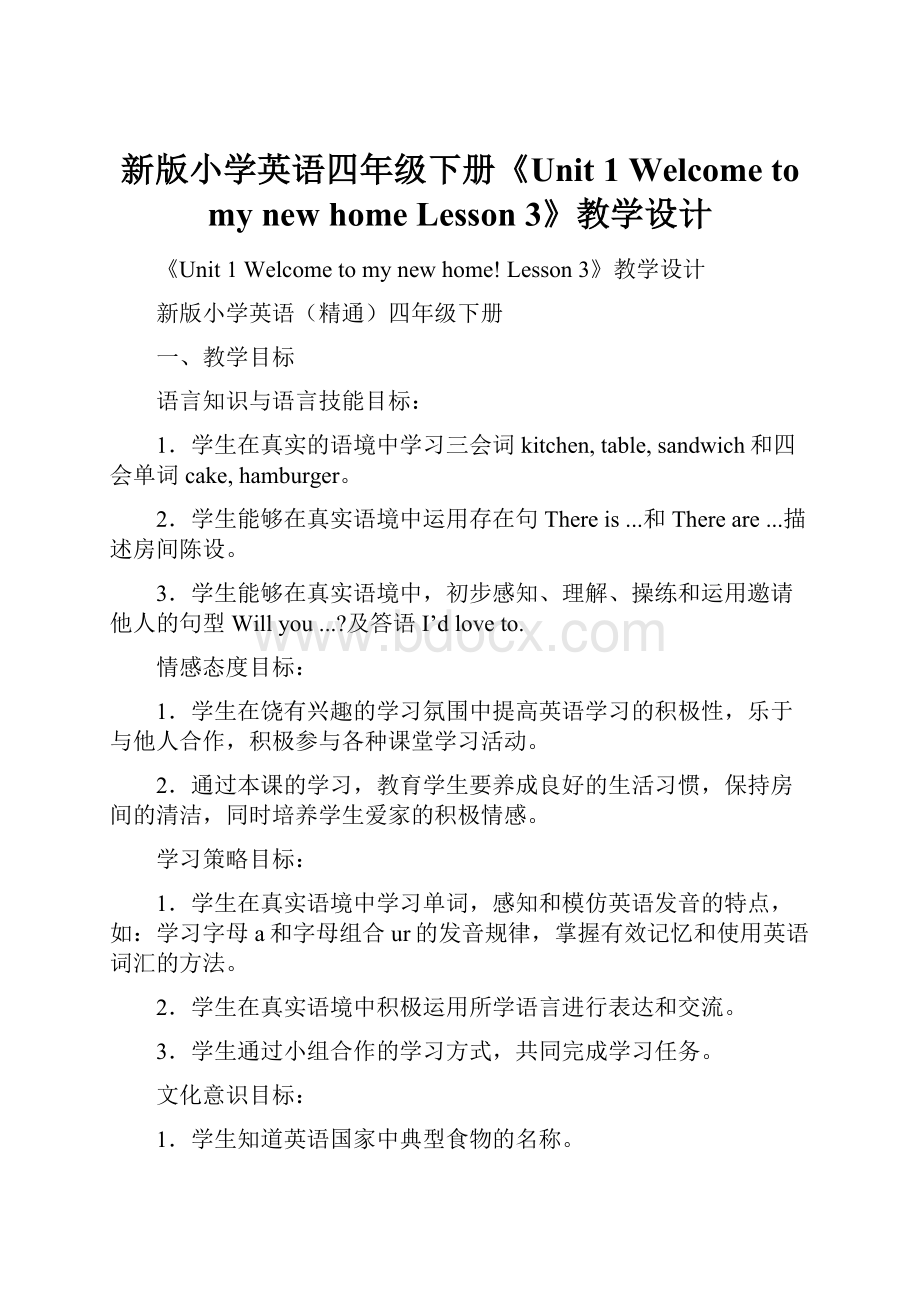新版小学英语四年级下册《Unit 1 Welcome to my new home Lesson 3》教学设计.docx
《新版小学英语四年级下册《Unit 1 Welcome to my new home Lesson 3》教学设计.docx》由会员分享,可在线阅读,更多相关《新版小学英语四年级下册《Unit 1 Welcome to my new home Lesson 3》教学设计.docx(13页珍藏版)》请在冰豆网上搜索。

新版小学英语四年级下册《Unit1WelcometomynewhomeLesson3》教学设计
《Unit1Welcometomynewhome!
Lesson3》教学设计
新版小学英语(精通)四年级下册
一、教学目标
语言知识与语言技能目标:
1.学生在真实的语境中学习三会词kitchen,table,sandwich和四会单词cake,hamburger。
2.学生能够在真实语境中运用存在句Thereis...和Thereare...描述房间陈设。
3.学生能够在真实语境中,初步感知、理解、操练和运用邀请他人的句型Willyou...?
及答语I’dloveto.
情感态度目标:
1.学生在饶有兴趣的学习氛围中提高英语学习的积极性,乐于与他人合作,积极参与各种课堂学习活动。
2.通过本课的学习,教育学生要养成良好的生活习惯,保持房间的清洁,同时培养学生爱家的积极情感。
学习策略目标:
1.学生在真实语境中学习单词,感知和模仿英语发音的特点,如:
学习字母a和字母组合ur的发音规律,掌握有效记忆和使用英语词汇的方法。
2.学生在真实语境中积极运用所学语言进行表达和交流。
3.学生通过小组合作的学习方式,共同完成学习任务。
文化意识目标:
1.学生知道英语国家中典型食物的名称。
2.学生在英语学习过程中接触和了解西方快餐文化,能初步注意到中外饮食文化的差异。
二、教学重难点
教学重点:
学生能够在真实语境中运用存在句Thereis...和Thereare...描述房间陈设。
教学难点:
学生能够在真实语境中,初步感知、理解、操练和运用邀请他人的句型Willyou...?
及答语I’dloveto.
三、教学策略
1.面向全体学生,为每个学生学习英语奠定基础。
在教学中,我坚持以学生为本,面向全体学生,让学生真正成为学习的主人。
我为学生提供广阔的思维空间和自主发展空间,让学生在课堂上动起来,让课堂气氛活跃起来,激发学生的深层思考和情感投入,鼓励学生在课堂上积极思考、乐于开口、敢于表达自己的观点和想法。
在导入环节,我引导学生观察图片,并运用本单元重点句型Thereis…和Thereare…谈论Kate的卧室及客厅陈设,激活了学生的旧知,为操练和产出环节提供了语言支持。
2.注重语言实践,培养学生的语言运用能力。
现代外语教育注重语言学习的过程,强调语言学习的实践性,主张学生在语境中接触、体验和理解真实语言,并在此基础上学习和运用语言。
在教学中,我尽可能多地为学生创设在真实语境中运用语言的机会,采用循序渐进的语言实践活动,如:
说唱韵文、找不同、参观Kate的新家、欣赏及谈论学生自己最喜欢的房间,引导学生学会自主学习和合作学习。
这些活动既强调了语言学习过程,又提高了学生的学习成效,同时培养了他们用英语做事情的能力,进而提升了学生的综合语言运用能力。
四、教学过程
教学环节
教学活动
设计意图
Step1:
Warmingup
1.Let’ssinganEnglishsong:
Thereisakangarooinmykitchen.
教学资源运用:
动画视频。
教学指导策略:
活跃课堂气氛,激发学生学习兴趣,同时复习、巩固存在句Thereis…\Thereare…
2.Freetalk
T:
Thisisafunnysong,isn’tit?
Ss:
Yes,itis.
T:
Areyouhappynow?
Ss:
Yes,weare.
T:
YouknowourfriendKateishappy,too.Becauseshewillhaveabirthdaypartyathernewhome.DoyoustillrememberKate’snewhome?
Ss:
Yes,wedo.
T:
Look,whatroomisit?
Ss:
It’sabedroom.
T:
What’sinthebedroom?
S1:
Thereisabedinthebedroom.
T:
Isitbigorsmall?
S1:
It’ssmall.
T:
Oh!
Hownice!
S2:
Thereare…
…
T:
Look!
Whatroomisit?
Ss:
It’salivingroom.
T:
What’sinthelivingroom?
S1:
Therearetwosofasandfourarmchairsinthelivingroom.
T:
Whatcolorarethey?
S1:
Theyarered.
S2:
Thereis…
…
教学资源运用:
图片。
教学指导策略:
培养学生观察和思维能力,提高口语表达,激活旧知。
Step2:
Presentation
1.在真实情境中学习新词kitchen。
T:
Boysandgirls,IthinkKate’sbedroomandlivingroomaresonice.Doyouthinkso?
Ss:
Yes,Ithinkso.
T:
TodaywewillgoontovisitanotherroomofKate’snewhome.(Pointtotheblackboarddesign)Isthisalivingroom?
Ss:
No,itisn’t.
T:
Thenwhatroomisit?
Ss:
It’sakitchen.
T:
Teachthenewwordkitchen
T:
Youknowkitchenisaroomusedforcooking.Andwecandomanythingsinthekitchen.Whatcanwedointhekitchen?
S1:
Wecanbakecookiesinthekitchen.
S2:
Wecan…
教学资源运用:
词卡。
教学指导策略:
通过板画突出情境,学生在真实语境中学习新词kitchen。
同时提高学生自主表达能力。
2.预测课文主题图,发散学生的思维。
T:
TodaywewillgoontovisitKate’skitchenwithLiYan.(Pointtotheblackboarddesign)See,thereisatableinthekitchen.Andthereissomefoodonthetable.What’sonthetable?
Canyouguess?
S1:
Maybethereissomebreadonthetable.
S2Maybethereare…
…
教学资源运用:
简笔画。
教学指导策略:
发散学生思维,提高口语表达。
3.学生带着问题看课文视频,回答问题,学习新词cake\hamburgers\sandwiches及板书重点句型:
Thereis…\Thereare…
T:
What’sonthetable?
Let’swatchthedialogue.
T:
What’sonthetable?
S1:
Thereisabigcakeonthetable.
T:
Teachthewordcake
T:
Andwhatelse?
S2:
Therearesomehamburgersandsandwichesonthetable.
T:
Teachthewordshamburgersandsandwiches.
T:
WhatdoesLiYansay?
Listen!
S3:
Thereisabigcakeonthetable.(T:
板书Thereis…)
T:
WhatelsedoesLiYansay?
Listen!
S4:
Therearesomehamburgersandsandwichesonthetable.(T:
板书Thereare…)
教学资源运用:
教材配套动画、课件、图片。
教学指导策略:
学生整体感知对话,在捕捉关键信息的同时学习新词,提炼重点句型。
4.学生带着问题再次看课文视频,回答问题,提炼本课难点句型Willyou…?
和I’dloveto.
T:
WeknowKatewillinviteLiYantoherbirthdayparty.WhatdoesKateask?
Let’swatchthedialogueagain.
T:
WhatdoesKateask?
S1:
Willyoucometomybirthdayparty?
T:
WillLiYancometoKate’sbirthdayparty?
Ss:
Sure!
T:
Howdoyouknow?
S2:
I’dloveto.
教学资源运用:
教材配套动画、课件。
教学指导策略:
学生再次整体感知对话,在捕捉关键信息的同时提炼难点句型。
5.角色体验
T:
Nowlet’shavearoleplay.
(Kate:
Willyoucometomybirthdayparty?
\LiYan:
I’dloveto.)
教学资源运用:
人物头饰、PPT演示文稿。
教学指导策略:
在真实语境中操练本课难点句型Willyou…?
和I’dloveto.
Step3:
Practice
1.多种形式朗读对话,内化语言。
(1)Listenandrepeatthedialogue.
(2)Teacherandonestudentreadthedialogueindifferentroles.
(3)Openthebooksandreadindifferentroles.
(4)Showtherole-playreading.
(5)Teacherandonestudentactthedialogue.
(6)Closethebooksandactinpairs.
(7)Showtheacts.
教学资源运用:
PPT演示文稿、教材、人物头饰。
教学指导策略:
通过不同形式的朗读对话,内化语言。
从个人到小组到全班的活动,从模仿读,到自己认读,到分角色朗读课文。
依据学生的需求,由浅入深,逐层递进,帮助学困生掌握本课最基本的知识,落实本课的重点知识,培养学生听说认读的习惯和合作精神。
2.韵文说唱。
T:
WeknowKatewillhaveabirthdaypartyathernewhome.AndIprepareachantforherparty.Willyouchantnow?
Ss:
Sure!
I’dloveto.
教学资源运用:
教师创编韵律诗,教师自制PPT演示文稿。
教学指导策略:
学生进行演唱韵律诗,复习巩固重点句型。
3.游戏:
找不同。
T:
TodayLiYanisveryhappyatKate’snewhome.Andnowtheywanttoplayagame.Willyoujointhem?
Ss:
Sure!
I’dloveto.
T:
Lookatthispicture.Therearetwokitchensinit.ThisiskitchenAandthisiskitchenB.Andtherearemanydifferencesbetweenthem.See,thereisatableinkitchenA.WhatcanyouseeinkitchenB?
S1:
ThereisatableinkitchenB.
T:
Aretheydifferent?
S1:
Yes.ThetableinkitchenAisbrown.ButthetableinkitchenBisyellow.
T:
Right!
NowpleasetalkaboutthedifferencesbetweenkitchenAandkitchenB.Wokinpairs.
T:
Howmanychairs?
\What’sonthewall?
\What’sonthetable?
\What’sonthedesk?
Pairwork:
Sa:
InkitchenA,thereis\are…
Sb:
InkitchenB,thereis\are…
T:
Look!
TherearemanydifferencesbetweenkitchenAandkitchenB.Whichkitchendoyoulike?
Why?
S:
IlikekitchenB.Becauseit’sveryclean.
T:
Iagreewithyou.IthinkkitchenBisveryniceandclean.ButkitchenAisverydirtyandmessy.See,thereissomepeelonthefloorandthechairsarecrooked.Soweshouldkeepourroomsclean.Doyouthinkso?
Ss:
Yes,Ithinkso.
教学资源运用:
PPT演示文稿。
教学指导策略:
培养学生观察、思维和表达能力,学生小组合作操练所学语言,培养合作精神,同时渗透积极的情感态度:
养成良好的生活习惯,保持房间的清洁。
4.参观Kate的新家。
T:
WeknowKatewillhaveabirthdaypartyathernewhome.Willyoucometohernewhome?
Ss:
Sure!
I’dloveto.
T:
Nowlet’sgoandvisitKate’snewhome.ThefirstroomwewillvisitisKate’skitchen.Oh!
Hownice!
Group1,youwillbehereandtalkaboutKate’skitchen.Clear?
Group1:
Yes.
T:
Thenwegoahead.ThenextroomwewillvisitisKate’slivingroom.Oh!
Howbig!
Group2,youwillvisitKate’slivingroom.OK?
Group2:
OK!
T:
Andthen,wegoupstairs.ThethirdroomwewillvisitisKate’sstudy.Itlookssmallbutnice.Group3,youwillsithereandtalkaboutKate’sstudy.Understand?
Group3:
Yes.
T:
AndthelastroomwewillvisitisKate’sbedroom.Itlooksverycomfortable.Group4,youwillvisitKate’sbedroom.OK?
Group4:
OK!
T:
Waitaminute!
BeforevisitingKate’snewhome,I’llgiveyouanexample.NowI’mKate,Whowillbethevisitor?
(师生示范)
T:
Nowlet’sgoandvisitKate’snewhome.Pleaseworkinpairs.OneisKate,theotheristhevisitor.
Ss:
VisitKate’snewhomeinpairs.
Showtheacts.
教学资源运用:
PPT演示文稿。
教学指导策略:
学生在真实语境中运用所学语言,培养学生综合语言运用能力,同时培养了学生小组合作精神。
Step4:
Production
1.学生观看视频,欣赏自己最喜爱的房间。
T:
IlikeKate’snewhomeverymuch.ButIlikemyownhomebest.Doyouloveyourownhomes?
Ss:
Yes,Ido.
T:
Asweknow,east,west,homeisbest!
Soweshouldloveourownhomes,right?
Ss:
Yes.
T:
Nowlet’senjoyourfavoriterooms.
教学资源运用:
自制短片。
教学指导策略:
充分开发和利用学生资源,有效激活学生已有的知识和经验,激发学生的学习兴趣,丰富教学内容。
2.小组合作谈论自己最喜爱的房间。
T:
Boysandgirls,showmeyourphotos.Let’stalkaboutourfavoriterooms.FirstI’llsetanexampleforyou.(师生示范)
T:
Pleasetalkaboutyourfavoriteroomswithyourpartners.
Ss:
Talkabouttheirfavoriteroomsinpairs.
Showtheacts.
教学资源运用:
房间照片。
教学指导策略:
充分开发和利用学生资源,有效激活学生已有的知识和经验,激发学生的学习兴趣,丰富教学内容。
同时,学生在真实语境中运用所学语言,发展了综合语言运用能力,培养了小组合作精神。
Step5:
Ending
Homework:
1.Recitethedialogue.
2.Introduceyourfavoriteroomtoyourpartner.
五、学习效果评价设计
1.语言评价:
(1)教师激励性的话语贯穿整个教学过程,如:
Great!
Super!
Excellent!
Fantastic!
Wonderful!
Perfect!
Welldone!
Goodjob!
Nicework!
等。
对于表现欠佳的学生,我也会安慰和鼓励他们,如:
Don’tbenervous.Don’tbeshy.Nevermind.Itdoesn’tmatter.Youcandobetternexttime.
(2)学生之间的语言评价,如:
Good!
Verygood!
Excellent!
等,同时小组之间还进行互评,展开竞赛,使学生有了竞争意识。
教师的语言评价充分地调动了学生学习的积极性,学生从中受到鼓舞,体验到成功的乐趣,增强了他们学习英语的自信心。
2.教学目标达成度:
(1)通过观看教材配套动画回答问题评价学生教学目标1的达成情况。
(2)通过找不同的游戏评价学生教学目标2的达成情况。
(3)通过小组合作参观Kate新房和谈论自己最喜欢的房间评价学生教学目标2、3的达成情况。